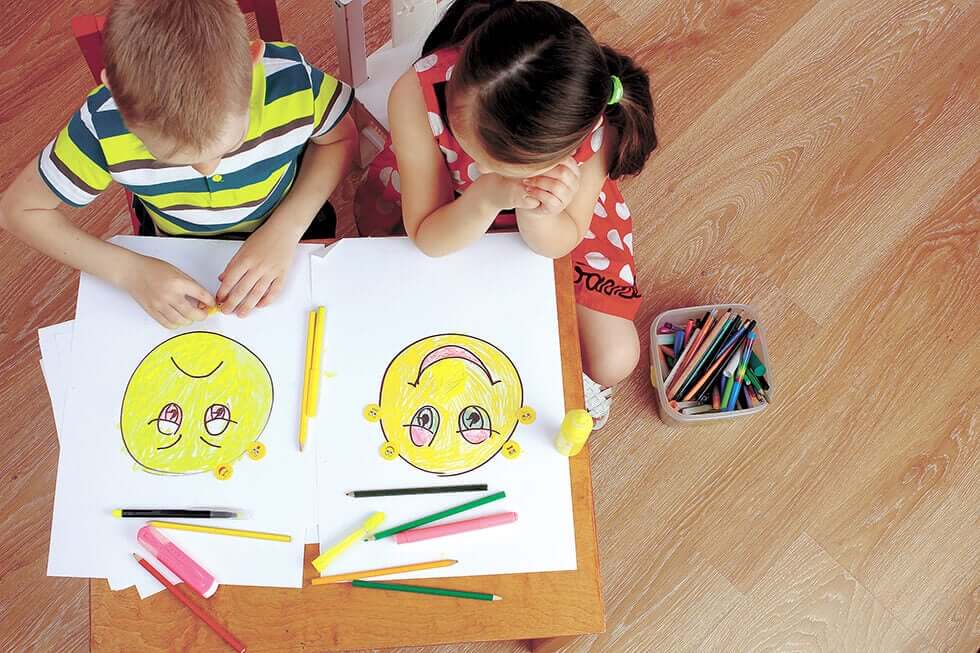How to develop emotional intelligence in children
Emotional management is part of a school-age child’s learning. How to develop emotional intelligence is a key issue in their education, this type of competency can be stimulated, to encourage their personal and social skills.
The school is a suitable environment to practice emotional skills, it is a space they share with other children and in which they must express their emotions on a daily basis, much of what they learn in the classroom will be the basis for their future behaviors as adults.
Our International school in Almeria, we insist on the importance of the emotional level from the first grades, in our classrooms we carry out all kinds of activities to reinforce their emotional abilities.
The importance of emotional intelligence
Before analyzing how to develop emotional intelligence, it is important to determine the objectives that we must achieve with this type of activities.
- One of the main objectives is based on getting them to know their own feelings better and to be able to identify the feelings of others. If we achieve this, the student will learn to give appropriate emotional responses in any situation.
- The management of negative feelings is also an important part of learning. Frustration, sadness or anger are very common responses, but they must learn to manage them properly.
- Stress management is also one of the basic objectives to be learned through these activities. School-age children can be subjected to stressful situations, which it is important that they deal with appropriately.
- The reinforcement of positive attitudes is also included in their emotional education. At this age, they learn not to obsess over negative thoughts and to reinforce positive emotions.
- Finally, it is important that they begin to be emotionally independent; classroom activities are the best training for daily life.
How to develop emotional intelligence
To develop a child’s emotional intelligence, we must insist on five different emotional planes. If a child learns to recognize these emotional planes, he or she will be prepared to face the challenges that the future holds.
Self-awareness
Self-awareness is the foundation of emotional education. A child must be aware of himself, he must know how to recognize the emotions he or she feels and the way they affect him or her.
Self-awareness is the first step in building self-esteem and learning the basic concepts related to emotions.
Regulation
Feelings are perceived and managed individually, so it is important that they learn to regulate emotions that, although mostly caused by external factors, affect them personally.
Motivation
Motivation is one of the most important factors for their emotional development. Beyond external stimuli, it is important that they learn to look for motivations on their own and get excited about what surrounds them.
Empathy
Empathy has to do with others, it is the ability to interpret other people’s feelings and give appropriate responses. It is at this age when we learn to put ourselves in other people’s shoes.
Sociability
Social skills establish emotional dialogues, that is, an exchange of feelings and emotions that we must begin to manage from childhood, through emotional learning.
The importance of emotional learning at school
For a child, school is one of the first social environments in which he or she must interact. It is a perfect space for emotional education, because the interaction with people their age is continuous, and they will experience all kinds of emotions on a daily basis.
The academic phase will generate in the child very positive feelings related to joy, fun, success, motivation or courage, but it will also generate episodes of sadness or frustration. During the infant and primary school years, the student learns to interpret these feelings in other people, and to manage the responses to be given in the school environment.
The main advantage of school age in terms of emotional learning is related to the rehearsal that school is, in terms of the emotional intelligence that he or she will have to show in his or her future life. If we add emotional activities to the daily management of emotions, we will be encouraging their abilities and preparing them for future challenges.
The development of emotional intelligence in the family environment
In addition to emotional development at school, a child must also learn to manage his feelings in his family environment. The family is his main socialization nucleus, and the one that will influence him the most throughout his life, especially during his first years, that is why it is important that the emotional education of a child begins in the family and develops correctly on a daily basis.
Just like at school, family coexistence will provoke both positive and negative personal feelings, as well as the need to develop empathic abilities, and if we also carry out activities to stimulate their emotional responses, we will be improving their emotional intelligence.
In general terms, a child should feel safe and protected in the family environment, but it is also important that he or she feels stimulated to make his or her own decisions and improve those emotional aspects that he or she has not yet learned.
Emotional intelligence at The British School of Almería
Emotional competence plays a very important role in our educational programs. The infant and primary school years are a time in which students experience all kinds of emotions, managing them correctly is important in order to face later years and apply this learning beyond the classroom.
Our teachers take into account the emotional aspect of the students, we want each one of them to be free to express their feelings, and at the same time, to be able to develop empathic abilities.
At The British School of Almeria we support the well-being of all our students through a teaching method that treats emotional intelligence as one of the most important aspects of their education.
